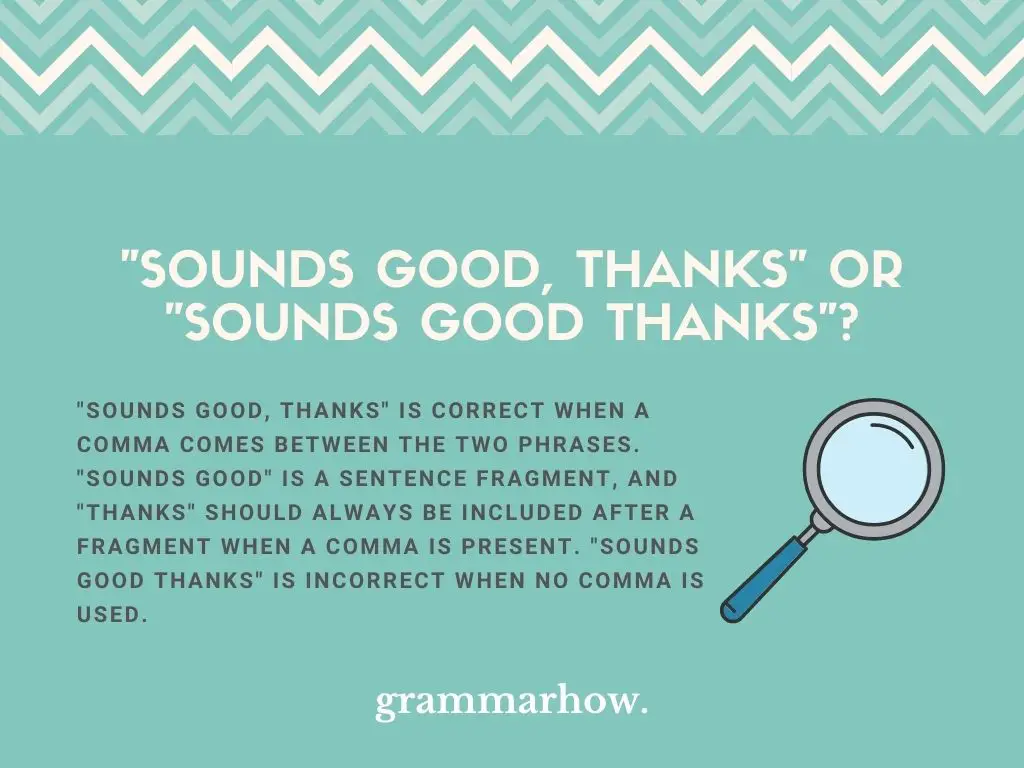“Sounds good” is an informal phrase that people use to accept positive information. You can include “thanks” after it as a sign of appreciation, but you need to know how to punctuate it. This article will explore the best ways to punctuate the phrase.
“Sounds Good, Thanks” or “Sounds Good Thanks”?
“Sounds good, thanks” is correct when a comma comes between the two phrases. “Sounds good” is a sentence fragment, and “thanks” should always be included after a fragment when a comma is present. “Sounds good thanks” is incorrect when no comma is used.

Some people will remove the comma for informal purposes. For example, you might see “sounds good thanks” used when someone is sending you a text message. Formal rules don’t apply when texting people.
For the most part, it’s better to keep the comma present. The same rules apply no matter what phrase you’re using before saying “thanks:”
- That’s it, thanks.
- It’s John, thanks.
- Try harder, thanks.
- I’ll be there, thanks.
As you can see, “thanks” always comes after the comma to help break up the main phrase.
Sounds Good Thanks
“Sounds good thanks” is incorrect. You can’t use it in this way because the comma isn’t present. It does not allow you to make an appropriate break in the phrase. Some people might use it informally, but it’s best to avoid using this in all cases.
- Correct: Sounds good, thanks. I’ll let you know what I find out.
- Incorrect: Sounds good thanks. I’ll be sure to be there later on today.
- Correct: Sounds good, thanks. I tried my best to get there today, but I failed.
- Incorrect: Sounds good thanks for that. I’ll be sure to check in with you again later.
Sounds Good, Thanks
“Sounds good, thanks” is grammatically correct. It follows standard English rules that show that “thanks” can only come after a main sentence fragment or clause. It’s appropriate to use a comma before “thanks” when it’s the last word in the sentence.
If you don’t include “thanks” as the last word (i.e. “Thanks for your help”), you’ll find that the comma no longer works.
- Oh, that sounds good, thanks. I’ll be sure to check out more about it.
- Sounds good, thanks. I know you’ll be able to help me out when I need it.
- Sounds good, thanks. I’ll be sure to take a look into some of this stuff.
- Sounds good, thanks. Let me know if there’s anything else I can do.
Sounds Good. Thanks
“Sounds good. Thanks” is correct if “thanks” is the start of a new clause or sentence. You can use it in this way when saying something like, “Thanks for trying” or “Thanks for helping.” It shows that there’s a long pause between “good” and “thanks.”
This is another grammatical rule that you can use if you’re extending your appreciation in some way.
- Sounds good. Thanks for letting me know about it. I look forward to hearing more.
- Sounds good. Thanks for spending the time to speak to me about that.
- Sounds good. Thanks for being there for me. You’re the best.
- Sounds good. Thanks. I’ll be sure to hire him when his name pops up.
Sounds Good; Thanks
“Sounds good; thanks” works in a similar way to the period variation. You can use the semicolon if you don’t want to take as long of a break as with the period. It still counts as if you’re starting a new sentence, so it’s best to use it with longer “thanks” sentences.
The semicolon works in a very similar way to the period. You can use it to end sentences with a short break, so it looks like two sentences are combined into one.
- Sounds good; thanks. I’m not sure I’m the best person to go to here, though.
- Sounds good; thanks for all your help. I’ll be sure to keep you in mind in the future.
- Sounds good; thanks for being so helpful. I know we will be able to use you going forward.
- Sounds good; thanks. I couldn’t have done any of this without you.
Final Thoughts
“Sounds good, thanks” should always have a comma if you use it as a simple sentence. “Sounds good thanks” is incorrect. There are some cases where you might prefer to end the sentence after “good,” which makes “sounds good. Thanks” and “sounds good; thanks” correct.
You may also like: 12 Better Ways To Say “Sounds Good”

Martin holds a Master’s degree in Finance and International Business. He has six years of experience in professional communication with clients, executives, and colleagues. Furthermore, he has teaching experience from Aarhus University. Martin has been featured as an expert in communication and teaching on Forbes and Shopify. Read more about Martin here.
